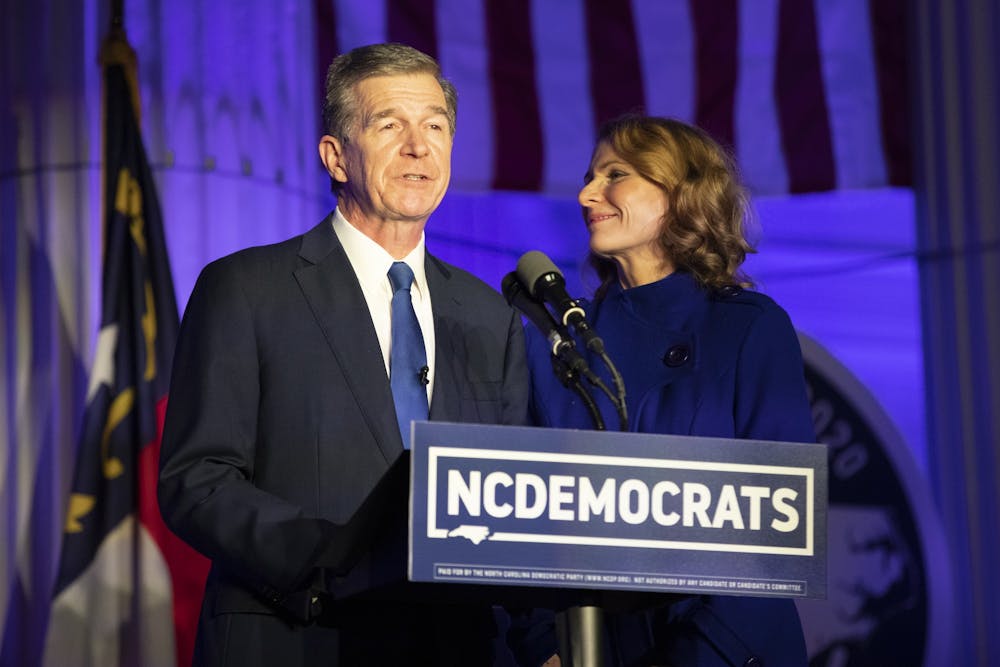“However imperfect this budget is, our schools, our communities, our small businesses, our families need our help right now, especially as we recover from this pandemic,” Cooper said in a Nov. 16 press conference. “I will sign this budget because of its critical and necessary investments, and I will fight to fix its mistakes.”
North Carolinians have had mixed reactions to the budget.
In a Nov. 16 press release, N.C. Superintendent of Public Instruction Catherine Truitt announced her satisfaction with the budget, citing the salary increases for teachers and the newly-established Supplementary Fund for low-wealth districts.
“This budget highlights many of the priorities that I have been advocating for since coming to office, and it provides the certainty we need to continue addressing the challenges that transpired because of COVID,” Truitt said in the press release.
The budget includes a $1,000 bonus for state employees and local education employees. There will be an additional $1,000 bonus for teachers and an additional $500 bonus for law enforcement, correctional officers and staff.
It also provides an average five percent raise over two years for school teachers and state employees, and increases the minimum wage for all non-certified public school employees to $15 per hour in the 2022-23 fiscal year.
Others, however, did not think the budget does enough to address the state's needs.
A Nov. 16 press release from Every Child NC called the budget unconstitutional because of its failure to fully fund the Leandro Comprehensive Remedial Plan. In the latest Leandro case development, N.C. Superior Court Judge David Lee ordered the state to provide $1.7 billion for public education.
“To the extent that this budget proposal funds 'Leandro' items, it is almost entirely concentrated in educator pay raises that barely keep pace with inflation,” the Every Child NC press release said. “Serious investments on behalf of English learners, students with disabilities, rural students, students from families with low incomes, and early learners are missing.”
The budget funds just 53 percent of the plan in the first fiscal year and 43 percent in the second, according to Kris Nordstrom, a senior policy analyst for the North Carolina Justice Center.
“You can’t pick and choose elements of the plan," he said. "The plan is designed to work together."
Nordstrom also cited the budget’s tax cuts as a failure to the state.
To get the day's news and headlines in your inbox each morning, sign up for our email newsletters.
The budget phases out the corporate income tax beginning in 2025, reaching zero by the end of the decade, and cuts the personal income tax rate from 5.25 percent to 3.99 percent by 2027, starting with 4.99 percent in 2022.
“Whatever short term benefits you get in this budget are going to be unsustainable going forward once those tax cuts go in place,” Nordstrom said. “So any victories here are short lived unless we have a real change in leadership that is willing to take the bold step of raising taxes.”
Suzy Khachaturyan, a policy analyst for the North Carolina Justice Center also cited the tax cuts as a reason for her displeasure with the budget.
“Tax cuts, especially those for the wealthy and corporations, really hurt all of us," Khachaturyan said.
The budget also provides an additional $1.5 billion above the base budget in recurring funds for K-12 education.
While the budget does provide some funding for education and teachers, other North Carolinians remain dissatisfied.
“A budget is a moral document which reflects what we think is important to invest in,” Naomi Hodges, a coalition coordinator at Every Child NC, said in an email. “By failing to adequately fund our public education system for another budget cycle, our General Assembly is saying that our students and teachers are not worth proper investments.”
@emmymrtin
@DTHCityState | city@dailytarheel.com
Emmy MartinEmmy Martin is the 2023-24 editor-in-chief of The Daily Tar Heel. She has previously served as the DTH's city & state editor and summer managing editor. Emmy is a junior pursuing a double major in journalism and media and information science.




